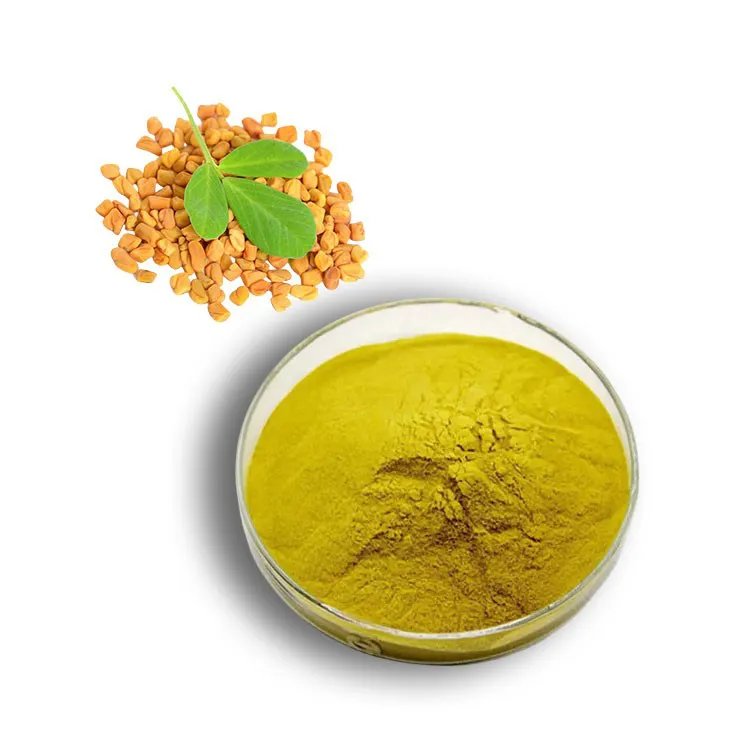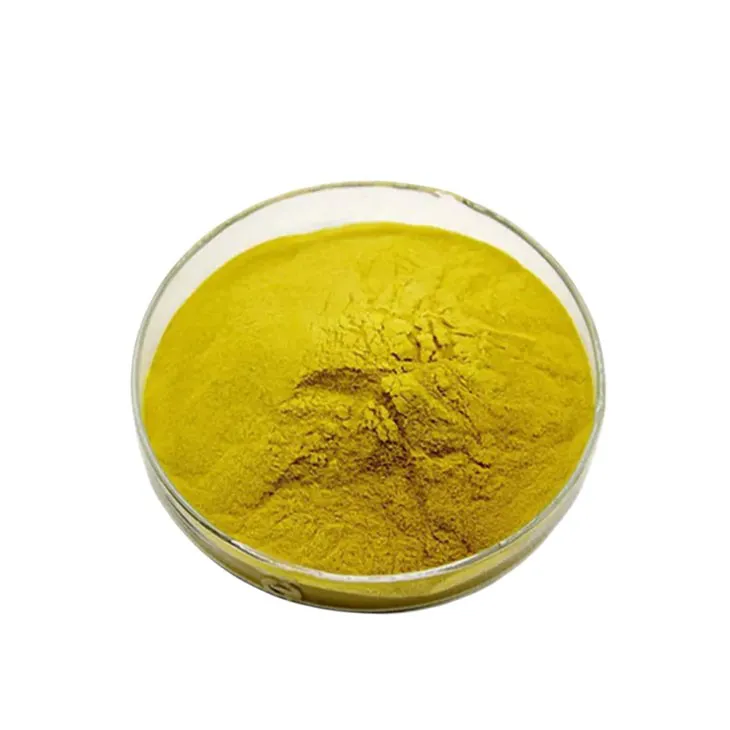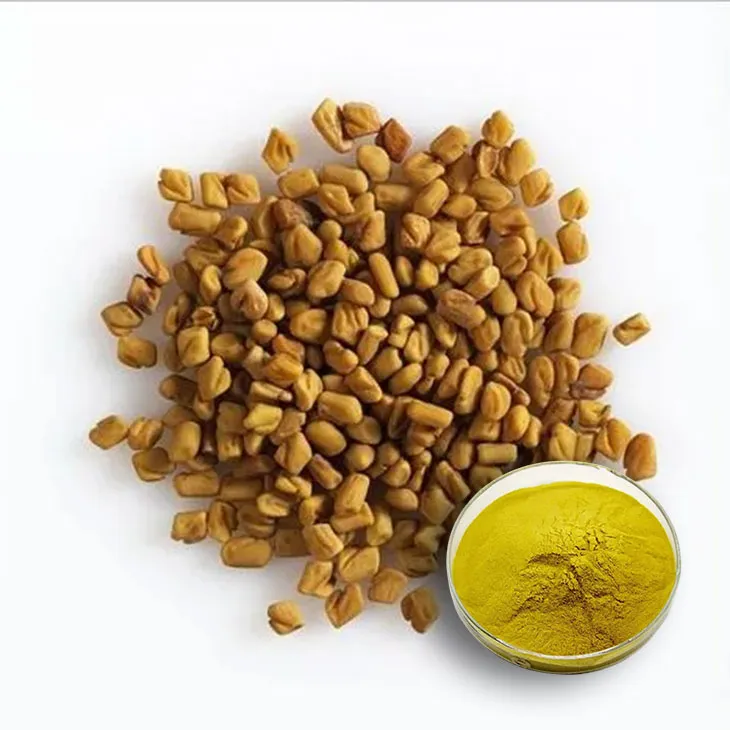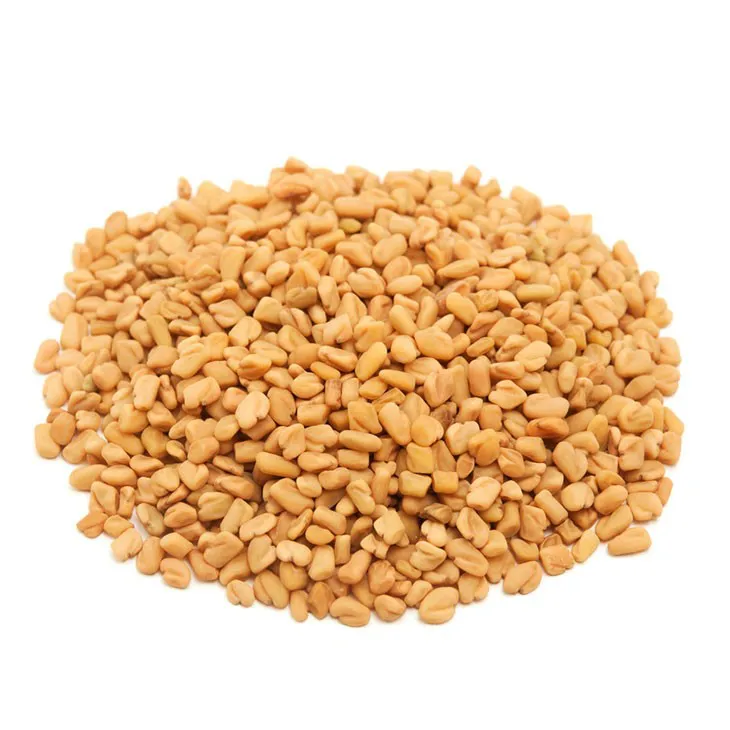- 0086-571-85302990
- sales@greenskybio.com
Extract fenugreek extract powder by using natural wood log method.
2024-11-26

1. Introduction
Fenugreek Extract Powder has gained significant popularity in various industries, including the food, pharmaceutical, and cosmetic sectors. The extraction process plays a crucial role in determining the quality, yield, and chemical composition of the final product. Among the different extraction methods, the natural wood log method stands out as a traditional yet effective approach. This article aims to explore in - depth how this method impacts the production of Fenugreek Extract Powder.

2. The Natural Wood Log Method: An Overview
The principle behind the natural wood log method lies in the unique interaction between the fenugreek seeds and the natural wood during the extraction process. Natural wood logs possess certain properties that can enhance the extraction efficiency. The porous structure of the wood can absorb and hold the extract components, facilitating the separation of the desired substances from the fenugreek seeds.
The selection of wood logs is a critical factor. Different types of wood have varying chemical compositions and physical properties. For fenugreek extraction, hardwoods such as oak or maple are often preferred. These woods are known for their durability and relatively stable chemical structures, which can withstand the extraction process without imparting unwanted flavors or chemicals to the extract.

3. Impact on Quality
3.1 Purity
One of the key aspects of quality in Fenugreek Extract Powder is purity. The natural wood log method can contribute to higher purity levels. During extraction, the wood can act as a natural filter, trapping impurities and preventing them from being incorporated into the final extract. For example, the wood's pores can physically block larger particles and some unwanted soluble substances, resulting in a purer fenugreek extract.
3.2 Flavor and Aroma
The use of natural wood logs can also have a positive impact on the flavor and aroma of the fenugreek extract powder. Wood imparts a unique, natural, and often pleasant scent to the extract. This is in contrast to some modern extraction methods that may use synthetic materials or harsh chemicals, which can sometimes leave an off - flavor or a chemical residue. The natural wood - induced aroma can enhance the overall sensory experience of the fenugreek extract, making it more desirable for applications in the food and cosmetic industries.

4. Influence on Yield
Initial extraction rate: The natural wood log method can potentially increase the initial extraction rate of fenugreek extract. The wood's porous structure provides a large surface area for the fenugreek seeds to interact with the extraction solvent. This increased contact area allows for more efficient extraction of the active components from the seeds in a shorter period of time.
Overall yield: In addition to the initial extraction rate, the natural wood log method can also contribute to a higher overall yield. As the wood helps in retaining the extract components during the extraction process, there is less loss of valuable substances. This means that more fenugreek extract can be obtained from a given amount of seeds compared to some other extraction methods.

5. Effects on Chemical Composition
5.1 Active Compounds
Fenugreek contains various active compounds such as saponins, flavonoids, and alkaloids. The natural wood log method can influence the extraction of these active compounds. For instance, the interaction between the wood and the fenugreek seeds may alter the solubility of these compounds, making them more or less accessible to the extraction solvent. In some cases, the wood may even chemically interact with certain compounds, enhancing their extraction or stability.
5.2 Nutritional Profile
The extraction method can also impact the nutritional profile of the fenugreek extract powder. Since the natural wood log method can lead to a more complete extraction of the active and nutritional components, the resulting extract powder may have a more balanced and rich nutritional content. This includes essential vitamins, minerals, and other bioactive substances present in fenugreek seeds.
6. Procedure of the Natural Wood Log Method
1. Preparation of materials:
- Select high - quality fenugreek seeds. Ensure that they are clean, free from debris, and of a suitable variety for extraction.
- Choose the appropriate natural wood logs. As mentioned earlier, hardwoods like oak or maple are often good choices. Cut the wood logs into suitable sizes, usually small pieces or shavings to increase the surface area for interaction.
- Prepare the extraction solvent. Commonly used solvents for fenugreek extraction include water, ethanol, or a combination of both. The choice of solvent depends on the intended use of the extract and the solubility of the desired components.
2. Extraction process:
- Place the fenugreek seeds and the prepared wood logs in a suitable extraction vessel. The ratio of seeds to wood should be optimized based on experimental results or previous experience.
- Add the extraction solvent to the vessel. Ensure that the seeds and wood are fully immersed in the solvent.
- Allow the mixture to stand for a certain period of time. This could range from several hours to days, depending on the extraction conditions such as temperature and the nature of the solvent. During this time, the active components from the fenugreek seeds will gradually be extracted into the solvent, with the assistance of the wood logs.
- Stir the mixture occasionally to ensure uniform extraction. This helps in increasing the contact between the seeds, the wood, and the solvent, thereby enhancing the extraction efficiency.
3. Separation and purification:
- After the extraction period is complete, the next step is to separate the extract from the solid materials (fenugreek seeds and wood). This can be done through filtration methods such as using filter paper or a filtration apparatus. The filtrate obtained contains the fenugreek extract.
- To further purify the extract, additional purification steps may be required. This could involve techniques such as evaporation to remove the solvent, leaving behind the concentrated fenugreek extract powder. Centrifugation can also be used to separate any remaining impurities or suspended particles.
7. Challenges and Limitations
1. Wood - related issues:
- The quality and consistency of the wood can vary. Different batches of wood may have different properties, which can affect the reproducibility of the extraction process. For example, the porosity or chemical composition of the wood may change depending on factors such as the age of the tree or the location where it was sourced.
- There is a potential for the wood to introduce contaminants. Although hardwoods are generally considered safe, there is still a small risk of the wood containing trace amounts of harmful substances such as heavy metals or pesticides, which could then find their way into the fenugreek extract.
2. Scale - up difficulties:
- The natural wood log method may be more difficult to scale up for large - scale industrial production compared to some modern extraction methods. The handling and preparation of the wood logs on a large scale can be cumbersome and require more space and resources.
- Ensuring uniform extraction across large volumes can be a challenge. In a large - scale setup, it may be difficult to maintain the same ratio of fenugreek seeds to wood and the same extraction conditions throughout the process, which could lead to variations in the quality and yield of the extract.
8. Conclusion
The natural wood log method offers a unique approach to extracting fenugreek extract powder. It has the potential to positively impact the quality, yield, and chemical composition of the extract. However, it also comes with its own set of challenges, particularly when it comes to scale - up for industrial production. Despite these limitations, for small - scale production or in cases where a more natural and traditional extraction method is desired, the natural wood log method can be a valuable option. Future research could focus on addressing the challenges associated with this method, such as improving the reproducibility and scale - up capabilities, to make it more viable for wider applications in the fenugreek extract powder production industry.
FAQ:
Question 1: What are the advantages of using the natural wood log method to extract fenugreek extract powder?
The natural wood log method is a traditional and effective way. One advantage is that natural wood logs can interact with fenugreek in a special way during extraction. This may lead to unique chemical reactions that can enhance the quality of the extract powder. Also, it might contribute to a higher yield compared to some other methods. Moreover, this method may help in maintaining or even enhancing certain beneficial chemical components in the fenugreek extract powder.
Question 2: How does the natural wood log method affect the quality of fenugreek extract powder?
The interaction between the natural wood logs and fenugreek during extraction can have a significant impact on quality. It may help in purifying the extract by removing impurities. The special interaction might also preserve or enhance the active compounds in fenugreek, such as its flavonoids or saponins, which are important for its various potential health benefits and applications. This can result in a higher - quality extract powder with more potent properties.
Question 3: Does the natural wood log method increase the yield of fenugreek extract powder?
There is a possibility that the natural wood log method can increase the yield. The unique interaction between the wood logs and fenugreek may facilitate a more complete extraction of the useful components from the fenugreek. This could mean that more of the desired substances are obtained from a given amount of fenugreek, thus leading to a higher yield of the extract powder compared to some alternative extraction methods.
Question 4: What are the main chemical components in fenugreek extract powder obtained by the natural wood log method?
Fenugreek extract powder obtained by the natural wood log method is likely to contain flavonoids, saponins, and other bioactive compounds. Flavonoids are known for their antioxidant properties, while saponins can have various physiological effects. The natural wood log method may influence the concentration and extraction efficiency of these components, ensuring that they are present in the final extract powder in appropriate amounts.
Question 5: Are there any limitations to the natural wood log method for extracting fenugreek extract powder?
One limitation could be the variability in the quality of the natural wood logs, which may affect the consistency of the extraction process. Also, this method might be more time - consuming compared to some modern, industrial - scale extraction methods. Additionally, there could be challenges in scaling up the process while maintaining the same quality and yield as in small - scale extractions.
Question 6: How can the natural wood log method be optimized for better extraction of fenugreek extract powder?
Optimization could involve carefully selecting the type of natural wood logs with the most suitable properties for interacting with fenugreek. Controlling the extraction parameters such as temperature, extraction time, and the ratio of fenugreek to wood logs is also crucial. Additionally, pre - treatment of the fenugreek or the wood logs might improve the extraction efficiency and the quality of the final extract powder.
Related literature
- Traditional Extraction Methods of Fenugreek and Their Impact on Extract Quality"
- "The Role of Natural Materials in Extracting Bioactive Compounds from Fenugreek"
- "Fenugreek Extraction: A Comparative Study of Different Methods Including the Natural Wood Log Method"
- ▶ Hesperidin
- ▶ citrus bioflavonoids
- ▶ plant extract
- ▶ lycopene
- ▶ Diosmin
- ▶ Grape seed extract
- ▶ Sea buckthorn Juice Powder
- ▶ Beetroot powder
- ▶ Hops Extract
- ▶ Artichoke Extract
- ▶ Reishi mushroom extract
- ▶ Astaxanthin
- ▶ Green Tea Extract
- ▶ Curcumin Extract
- ▶ Horse Chestnut Extract
- ▶ Other Problems
- ▶ Boswellia Serrata Extract
- ▶ Resveratrol Extract
- ▶ Marigold Extract
- ▶ Grape Leaf Extract
- ▶ blog3
- ▶ blog4
-
Chinese Withania somnifera Extract Factory.
2024-11-26
-
中国松树皮提取物粉粉末供应商
2024-11-26
-
High - quality Marigold Extract Products.
2024-11-26
-
100% Pure Natural Mango - Flavored Powder.
2024-11-26
-
Citrus Aurantii Extract
2024-11-26
-
Hops Extract
2024-11-26
-
Chia Seed Powder
2024-11-26
-
Sea buckthorn oil
2024-11-26
-
Curcuma Longa Extract
2024-11-26
-
Phellodendron Extract
2024-11-26
-
Plantain extract
2024-11-26
-
Cocoa Extract
2024-11-26
-
Reishi mushroom extract
2024-11-26
-
Kelp Extract Powder
2024-11-26





















